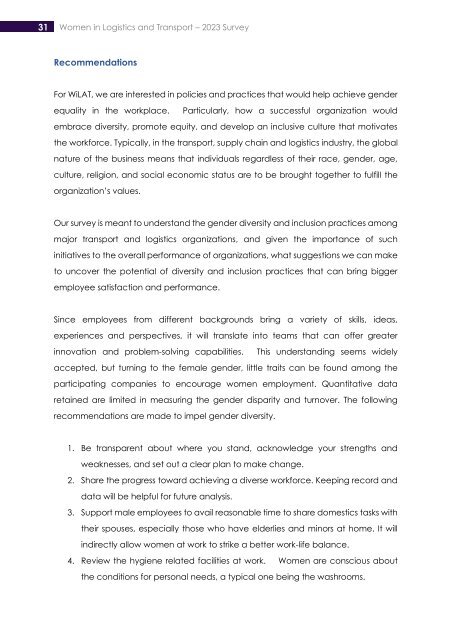WiLAT Survey Report 2023
Survey of Women in Logistics and Transport (WiLAT)
Survey of Women in Logistics and Transport (WiLAT)
You also want an ePaper? Increase the reach of your titles
YUMPU automatically turns print PDFs into web optimized ePapers that Google loves.
31 Women in Logistics and Transport – <strong>2023</strong> <strong>Survey</strong><br />
Recommendations<br />
For <strong>WiLAT</strong>, we are interested in policies and practices that would help achieve gender<br />
equality in the workplace. Particularly, how a successful organization would<br />
embrace diversity, promote equity, and develop an inclusive culture that motivates<br />
the workforce. Typically, in the transport, supply chain and logistics industry, the global<br />
nature of the business means that individuals regardless of their race, gender, age,<br />
culture, religion, and social economic status are to be brought together to fulfill the<br />
organization’s values.<br />
Our survey is meant to understand the gender diversity and inclusion practices among<br />
major transport and logistics organizations, and given the importance of such<br />
initiatives to the overall performance of organizations, what suggestions we can make<br />
to uncover the potential of diversity and inclusion practices that can bring bigger<br />
employee satisfaction and performance.<br />
Since employees from different backgrounds bring a variety of skills, ideas,<br />
experiences and perspectives, it will translate into teams that can offer greater<br />
innovation and problem-solving capabilities.<br />
This understanding seems widely<br />
accepted, but turning to the female gender, little traits can be found among the<br />
participating companies to encourage women employment. Quantitative data<br />
retained are limited in measuring the gender disparity and turnover. The following<br />
recommendations are made to impel gender diversity.<br />
1. Be transparent about where you stand, acknowledge your strengths and<br />
weaknesses, and set out a clear plan to make change.<br />
2. Share the progress toward achieving a diverse workforce. Keeping record and<br />
data will be helpful for future analysis.<br />
3. Support male employees to avail reasonable time to share domestics tasks with<br />
their spouses, especially those who have elderlies and minors at home. It will<br />
indirectly allow women at work to strike a better work-life balance.<br />
4. Review the hygiene related facilities at work. Women are conscious about<br />
the conditions for personal needs, a typical one being the washrooms.

















